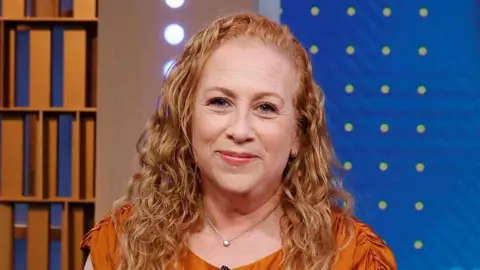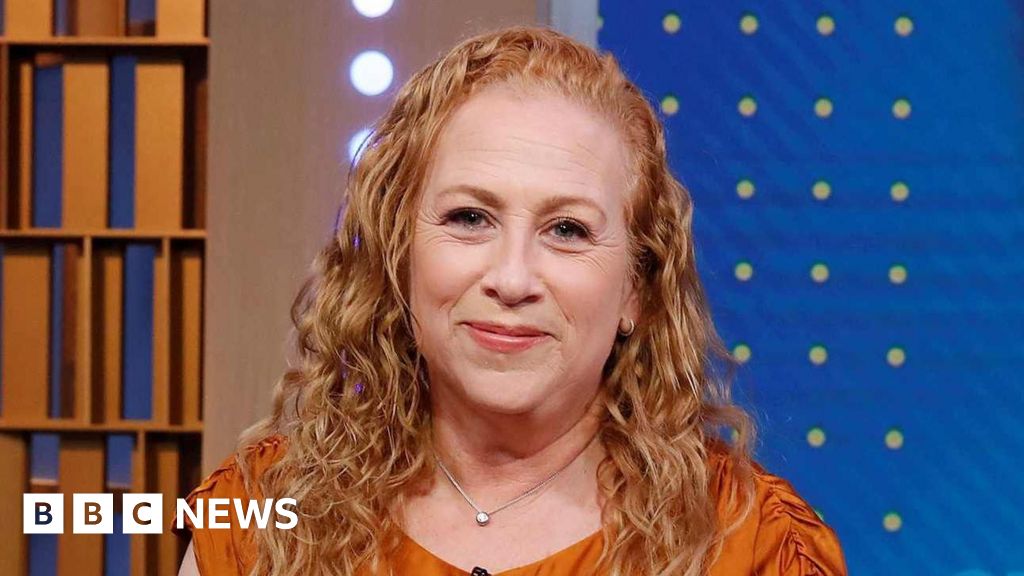Emma Saunders,Culture reporter at the Hay Festival
 Getty Images
Getty ImagesBestselling American author Jodi Picoult has said “the loss of free speech is a very, very slippery slope” and that having two of her books banned in school districts in some US states is “not a badge of honour”.
Speaking at the Hay Festival, Picoult said she was “very fortunate because I’m at a point in my career where people who are going to be buying my books are not in school libraries”.
But the author, who has written 30 books and sold around 40 million copies, said this wasn’t the case for younger authors, LGBTQ writers or people of colour, “whose livelihood is writing for middle grade and young adult readers. They are suffering greatly”.
Picoult said her books My Sister’s Keeper and Nineteen Minutes were affected by the bans.
Nineteen Minutes
Some libraries and classrooms in the US have removed books with sexual content or themes of sexuality, gender identity and race.
While some view this as censorship, others disagree. Some state authorities, such as Florida, have said they are not banning books but restricting inappropriate and harmful material.
“I’m currently banned in about 35 American states in school districts,” Picoult told the audience at Hay.
She said the reason Nineteen Minutes, which is about a US school shooting, was banned, was not because of the shooting scenes: “They have no problem with that. The problem is that on page 313, I use the term ‘erection’.”
Asked if it ever made her think about changing what she wrote, she said: “It only makes me want to keep doing it (what I’m doing).”
 Getty Images
Getty ImagesPicoult also discussed her upcoming novel, By Any Other Name.
It isn’t her first foray into historical fiction but this time it’s a parallel tale about contemporary young playwright Melina Green, who is struggling to get her work recognised in New York, and her ancestor, Emilia Bassano, who may – or may not – have been the female writer behind the work of Shakespeare.
“I feel like this was the book that I’ve been meant to write my whole life,” Picoult said.
“It’s really a book about how things have changed for women in 400 years – and how they have not changed.”
While Picoult’s book is, of course, a work of fiction, Bassano was a real-life Elizabethan woman.
Picoult does a great job of convincing the Hay audience to at least consider the idea that Bassano did write some of Shakespeare’s work, citing various theories she came across during her research.
What is definitely fact is that Bassano (later known as Emilia Lanier) was one of the first female published poets in England in the early 1600s.
There is also a theory that she was the Dark Lady who features in many of the Bard’s sonnets (although Picoult’s not persuaded).
“The truth is, I did a ton of research for this book. And I’m not going to tell you what to believe, I am just going to present the facts to you,” Picoult said, later adding that she thinks multiple people probably wrote Shakespeare’s plays.
Frustrated academic
Picoult is well-known for her meticulous research. If she was an actor, she would definitely be an advocate of the method technique.
“Research for me is actually the most fun part of the book because I get to live other people’s lives,” she says.
“So I have done everything that you see in a book or everything a character does in a book.”
That research includes visiting Death Row for Change of Heart and living with an Amish family for Plain Truth. Perhaps surprisingly, she says the latter was the “most challenging… they worked so hard, I don’t ever want to do that again!”
Unlike many authors, Picoult’s books are all very different, covering various genres including thrillers, romance, ghost stories and historical fiction.
“I am really, really lucky. I can write about anything I want, and I somehow have readers who go: ‘Great!’ A lot of writers don’t have that luxury,” she says.
“I also think a lot of writers make the mistake of chasing what they think is popular at the moment. I’ve always subscribed to the mantra that if I write what I want to learn, it’s going to be… the best book I can write at that moment. And I’m going to make you as interested as I am the subject.
“I really am this frustrated academic who isn’t in school any more who just wants to learn a lot! I don’t want to write the same book twice. And if I do… that’s probably when I should stop writing.”


